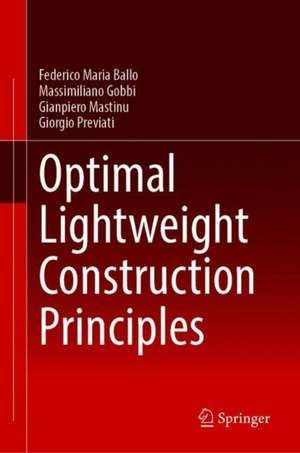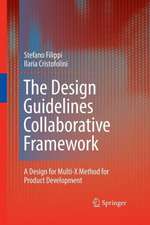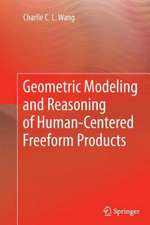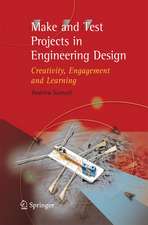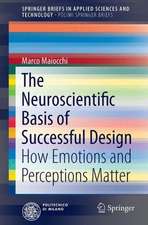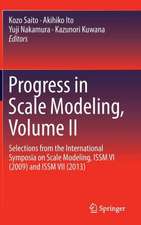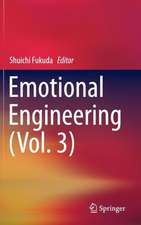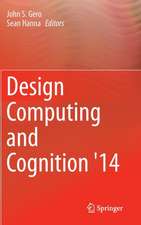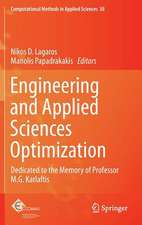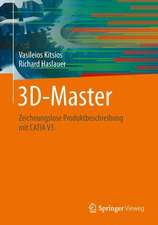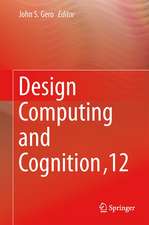Optimal Lightweight Construction Principles
Autor Federico Maria Ballo, Massimiliano Gobbi, Giampiero Mastinu, Giorgio Previatien Limba Engleză Hardback – 10 noi 2020
This book will be of interest to researchers and graduate students in the field of structural optimisation and multi-objective optimization, as well as to practitioners such as design engineers.
| Toate formatele și edițiile | Preț | Express |
|---|---|---|
| Paperback (1) | 697.15 lei 6-8 săpt. | |
| Springer International Publishing – 11 noi 2021 | 697.15 lei 6-8 săpt. | |
| Hardback (1) | 950.96 lei 6-8 săpt. | |
| Springer International Publishing – 10 noi 2020 | 950.96 lei 6-8 săpt. |
Preț: 950.96 lei
Preț vechi: 1159.71 lei
-18% Nou
Puncte Express: 1426
Preț estimativ în valută:
181.97€ • 190.47$ • 151.45£
181.97€ • 190.47$ • 151.45£
Carte tipărită la comandă
Livrare economică 31 martie-14 aprilie
Preluare comenzi: 021 569.72.76
Specificații
ISBN-13: 9783030608347
ISBN-10: 3030608344
Ilustrații: XVII, 283 p. 157 illus., 44 illus. in color.
Dimensiuni: 155 x 235 mm
Greutate: 0.6 kg
Ediția:1st ed. 2021
Editura: Springer International Publishing
Colecția Springer
Locul publicării:Cham, Switzerland
ISBN-10: 3030608344
Ilustrații: XVII, 283 p. 157 illus., 44 illus. in color.
Dimensiuni: 155 x 235 mm
Greutate: 0.6 kg
Ediția:1st ed. 2021
Editura: Springer International Publishing
Colecția Springer
Locul publicării:Cham, Switzerland
Cuprins
Engineering Design and Optimal Design of Complex Mechanical Systems: Definitions.- On the Analytical Derivation of the Pareto-Optimal Set with Application to Structural Design.- Bending Beams of Arbitrary Cross Sections – Optimal Design by Analytical Formulae.- Bending of Lightweight Circular Tubes.- Optimal Design of a Beam Subject to Bending: a Basic Application.- Multi-objective Analytical Optimisation of Highly Inflated Tubes Under Bending.- Thin-Walled Tubes Under Torsion: Multi-Objective Optimal Design.- An Application of Multi-Objective Stochastic Optimisation to Structural Design.- An Application of Analytical Multi-Objective Optimisation to Truss Structures.- Topology Optimisation of Continuum Structures: A Basic Introduction.- Concerned Topological Optimisation of Two Bodies Sharing Design Space.- Structural Optimisation in Road Vehicles Design.
Notă biografică
Dr Federico Ballo gained his MSc and PhD degrees from Politecnico di Milano in 2011 and 2015 respectively. He also worked here as a research fellow, in the department of Mechanical Engineering. His research interests include multi-objective optimisation of complex systems, the study and application of structural optimisation techniques and modelling and numerical simulation of mechanical systems and components. He is co-author of more than 30 contributions on international journals and national and international conferences.
Professor Massimiliano Gobbi gained his masters and PhD degrees in 1994 and 1998 respectively, both from the Politecnico di Milano. He was a full-time visiting scholar at the University of California, Berkley, before being appointed as associate professor at Politecnico di Milano in 2002, where he is now a full professor in the Department of Mechanical Engineering. He is a co-founder of SmartMechanical, and has published more than 180 technical papers, 7 international patents and two books.
Professor Gianpiero Mastinu is a full professor of Vehicle System Engineering at the Politecnico di Milano. He gained his PhD in 1989 from Politecnico di Milano, before being appointed as professor at TU Delft in 2000. He is the author of over 200 journal articles and two books. He is a member of numerous professional organisations, including being on the committee of conferences, and a member of the EAG of the FIA. His research interests include conceptual, functional and structural design, modelling and simulation of machines, and experimental mechanics.
Professor Giorgio Previati received his MSc in Mechanical Engineering from Politecnico di Milano in 2002, and his PhD from the same institution in 2006. He worked in the research and development department of SAME-DEUTZ-FAHR, before returning to Politecnico di Milano in 2008 as an assistant professor, where he is now an associate professor. His researchis primarily focused on the design and optimization of complex mechanical systems, particularly road vehicles and their subsystems, as well as the numerical simulation of the mechanical behaviour of rubber like materials. His is the author of around 80 scientific papers.
Professor Gianpiero Mastinu is a full professor of Vehicle System Engineering at the Politecnico di Milano. He gained his PhD in 1989 from Politecnico di Milano, before being appointed as professor at TU Delft in 2000. He is the author of over 200 journal articles and two books. He is a member of numerous professional organisations, including being on the committee of conferences, and a member of the EAG of the FIA. His research interests include conceptual, functional and structural design, modelling and simulation of machines, and experimental mechanics.
Professor Giorgio Previati received his MSc in Mechanical Engineering from Politecnico di Milano in 2002, and his PhD from the same institution in 2006. He worked in the research and development department of SAME-DEUTZ-FAHR, before returning to Politecnico di Milano in 2008 as an assistant professor, where he is now an associate professor. His researchis primarily focused on the design and optimization of complex mechanical systems, particularly road vehicles and their subsystems, as well as the numerical simulation of the mechanical behaviour of rubber like materials. His is the author of around 80 scientific papers.
Textul de pe ultima copertă
This book presents simple design paradigms related to lightweight design, that are derived from an in-depth and theoretically sound analysis based on Pareto theory. It uses numerous examples, including torsion and inflated tubes, to fully explain the theories discussed.Lightweight Construction Principles begins by defining terms in relation to engineering design and optimal design of complex mechanical systems. It then discusses the analytical derivation of the Pareto-optimal set, before applying analytical formulae to optimal design of bent beams. The book moves through numerous case studies of different beam and tube construction including beams subject to bending, thin walled tubes under torsion and truss structures.
This book will be of interest to researchers and graduate students in the field of structural optimisation and multi-objective optimization, as well as to practitioners such as design engineers.
This book will be of interest to researchers and graduate students in the field of structural optimisation and multi-objective optimization, as well as to practitioners such as design engineers.
Caracteristici
Presents numerous design models related to lightweight construction design Explores both simple and complex structures, demonstrating the applicability of the theory discussed Expands on Pareto-theory to provide a thorough analytical approach to design optimization
